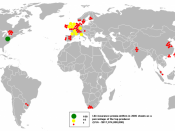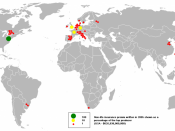CHAPTER 1
INSURANCE INDUSTRY-An overview
The insurance industry provides protection against financial losses resulting from a variety of perils. By purchasing insurance policies, individuals and businesses can receive reimbursement for losses due to car accidents, theft of property, and fire and storm damage; medical expenses; and loss of income due to disability or death.
Insurance business is divided into four classes :
1) Life Insurance business
2) Fire
3) Marine
4) Miscellaneous Insurance.
Life Insurers transact life insurance business; the rest is transacted by General Insurers. No composites are permitted as per law.
The business of Insurance essentially means defraying risks attached to any activity over time (including life) and sharing the risks between various entities, both persons and organisations. Insurance companies (ICs) are important players in financial markets as they collect and invest large amounts of premium. Insurance products are multi purpose and offer the following benefits :
1. Protection to the investors
2. Accumulate savings
3. Channelise savings into sectors needing huge long term investments.
ICs receive, without much default, a steady cash stream of premium or contributions to pension plans. Various actuary studies and models enable them to predict, relatively accurately, their expected cash outflows. Liabilities of ICs being long-term or contingent in nature, liquidity is excellent and their investments are also long-term in nature. Since they offer more than the return on savings in the shape of life-cover to the investors, the rate of return guaranteed in their insurance policies is relatively low. Consequently, the need to seek high rates of returns on their investments is also low. The risk-return trade off is heavily tilted in favour of risk. As a combined result of all this, investments of insurance companies have been largely in bonds floated by GOI, PSUs, state governments, local bodies,



Awesome
Awesome stuff....good work!!!
1 out of 1 people found this comment useful.